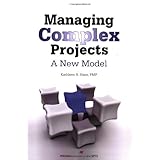
Average Reviews:

(More customer reviews)I'm surprised to be the first reviewer of this noteworthy effort a year and a half after its publication. Project complexity models have been around a while, and there's not much new here, but it's a nice compilation of the current literature on successfully managing complex projects. Part I introduces the science of complexity theory and is the most useful contribution. Part II is a helpful overview of the personal competencies required to successfully manage complex projects.
Part III, an attempt to map a catalogue of project management approaches to various types of projects based on level of complexity, is not as compelling. Approaches appropriate to low complexity projects include Waterfall, Rapid Application Development (RAD), and Critical Chain. Moderate complexity approaches include Spiral, Agile, Lean, and Skunk Works. High complexity approaches include Evolutionary Prototyping, and eXtreme Project Management. Much of this section is debatable, some disagreeable, and a bit even contradictory. Suffice it to say it's a gross over-simplification of a complex topic (and nearly lowered my rating to three stars).
Part IV applies complexity thinking to a number of specific complexity factors such as long-duration projects, dispersed projects, innovation projects, etc. Again, not much new here but the chapter on managing change is particularly helpful because every project, regardless of complexity, is about managing change.
In spite of its shortcomings, Managing Complex Projects was PMI's 2009 Book of the Year for good reason, and it deserves a spot on the project manager's bookshelf.
Click Here to see more reviews about: Managing Complex Projects: A New Model
Product Description:
2009 PMI Book of the Year!
Discover a New Model for Managing Today's Complex Projects! For organizations to thrive, indeed to survive, in today's global economy, we must find ways to dramatically improve the performance of large-scale projects. Applying the concepts of complexity theory can complement conventional project management approaches and enable us to adapt to the unrelenting change that we ignore at our own peril.
Managing Complex Projects: A New Model offers an innovative way of looking at projects and treating them as complex adaptive systems. Applying the principles of complexity thinking will enable project managers and leadership teams to manage large-scale initiatives successfully.
-Explore how complexity thinking can be used to find new, creative ways to think about and manage projects
-Diagnose complexity on a wide range of projects from small, independent, short projects to highly complex, longer projects
-Understand and manage the complexity of the business problem, opportunity, solution, and other dimensions that come into play when managing large-scale efforts
Use the Project Complexity Model to determine the most effective approach to managing all aspects of a project based on the level of complexity involved.
Want to read more honest consumer review about Managing Complex Projects: A New Model now ?

0 comments:
Post a Comment